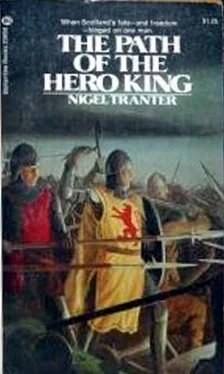Dundee had fallen at last, he announced. And Stirling would be theirs within the year.
Robert, on his sickbed, required a little while to take this in, and Edward expiated on his tactics at Dundee and what he had done to the English and the traitors therein. But it was not on this that his brothers mind fixed.
Stirling …? he said thinly.
You said … Stirling will be ours? Within a year. How can you be so sure?
Because I have come to terms with the captain, Sir Philip Moubray. If it is not relieved within the year, he yields Stirling to me. Moubray -he who struck you down at Methven fight…
You gave him a year! To be relieved? And … and raised the siege?
You did that?
Yes. So we win Stirling cheaply. I have his written word …
Cheap! However weak the Kings voice, it was intense enough.
You are a fool, Edward! A bigger fool than even I judged!
But … do you not understand? We are spared a long and wasteful siege. Such as you are ever against. Who will relieve Moubray?
My men are freed-and are now investing Linlithgow.
Then it will be Edinburghs turn …
Edward-what did our sire endow you with, for wits? his brother demanded.
You have given your plighted word? That Moubray has a year unassailed?
To be sure. Why not? Do you hate Moubray so much? Because he unhorsed you once! I say you should have hated MacDouall more,-who slew our brothers, Yet he you gave honourable terms to …
Gods mercy-listen to me, Edward! You have ensured the invasion of our country. On a scale we have not seen since Falkirk.
Stirling is the key to Scotland, as all do know. The English cannot, I say, ignore this. Cannot fail to come to the relief of Stirling. Once that is yielded, they have lost this long war. Moubray knows mat, if you do not. And now you have committed my honour, with your own. Given Edward of Carnarvon a year …
You have been giving English towns a years truce. For money!
The King, whose strength was ebbing, ignored that.
King Edward is now released from his foolish passion for his catamite, Gaveston. The English are no longer divided over that, for and against the King. His lords are spurring him to action against us, after all his folly and sloth. He is a weakling, but he has hard men round him. Men who will now control him. This of Stirling will give them what they need-a challenge. A challenge with a set time. To relieve Moubray and the key to Scotland. Edward will seek to redeem his name and fame. I see it all. All over England trumpets will blow …
Robert Bruces voice died away.
Chapter Twenty
Robert Bruce was right. All England saw that years bargain at Stirling as a challenge and a rallying-cry, not to be ignored.
Strangely, Bruces own raids over the Border, with all their attendant blackmail, seemed to have little effect on opinion in the far south; but the Stirling ultimatum was different. Englands name, fame and honour were at stake. That winter of 1313-14, plans were laid for the greatest invasion of Scotland ever mounted. Not only was Stirling to be relieved, and dramatically, but the whole wretched country was to be ground into the dust, once and for all.
By spring the trumpets were sounding indeed, for muster from one end of England to the other. King Edward set his invasion for Easter.
Bishop Lamberton arrived back in Scotland, finally, for good or ill, to celebrate that Eastertide in his own land, parole broken-since no one seemed interested in it any longer, anyway.
He brought word that the invasion had been postponed until late May, when there would be more grass to feed the hundreds of thousands of horses involved-always a major problem.
So, by late May, the Bruce, almost himself again, though thin, had reluctantly taken up his position just south of Stirling. A head on confrontation with the embattled might of England was still the last thing that he desired; but now there was no alternative, unless he was prepared to abandon all but the Highlands to the enemy, The waist of Scotland had to be held.
The English would, of course, seek to relieve the castle. But that was not the vital matter. It was the crossing of the Forth at the narrow slip of firm land between the vast morasses of the Flanders Moss and the widening firth, that mattered-Stirling Bridge, as ever the key.
The enemy must approach that key crossing east-about or west about;
round Stirling Rock, castle and town, by the flat links of the Carse,
boggy and broken by burns, runnels, ditches; or west by the scattered
woodlands and hillocks of the former royal hunting park, really only an extension of the great forest of the Tor Wood. One, or both, of these. There was no alternative.
So, as his forces assembled from all over the land, Bruce applied his wits to the task of turning this entire approach area into a maze of traps. It was not difficult in the lowlying Carse, for the flats were already waterlogged and pitted with holes. It was the causeways and banks and dykes through it on which they had to concentrate, and, as mud-slaistered as his men, the King spent long May days cutting, digging, undermining and covering over, so that to the untutored eye the place appeared as before-but was not The inland higher ground was a much more difficult proposition.
The scattered woodland would admittedly tend to break up enemy heavy cavalry formations; but the whole area was too widespread and open for defensive works. Only at one point was there any opportunity to improve on nature. All this upland of knowes and hollows was drained by small burns south eastwards into a major stream, the Bannock Burn, which cut a dee pish ravine for itself down to the windings of the Carse flats. The road from the south crossed this stream, just above the edge of the low ground, and there was no other convenient crossing near by. The ground on either side of this crossing was open, so there was no opportunity for ambush; anyway, a huge army cannot be ambushed.
But some distance beyond the crossing, the road forked, one prong following the flats, the direct route to the town and Stirling Bridge; the other striking off to the left, and upwards, across King Alexanders New Park, round the west side of the Rock and so along the south lip of the Flanders Moss. If the English decided on a west-about approach, they were bound to take this road. And before it actually climbed to enter the wooded area, there was a wide grassy level entry indeed it was known as The Entry, especially constructed for deer-driving. The Entry was flat and nearly half a mile wide to the south, but narrowing-in like a funnel to a mere fifty or so yards on either side of the road.
Here Bruce got to work, using the same ideas that he had developed at the Battle of Loudoun Hill-and hoped that it would not again be Pembroke who led the English. Deep lateral trenches were dug at irregular intervals across that triangle of green, with stakes in their foot, and all carefully covered with woven brushwood and then grassy turfs brought from areas out of sight. The wooded flanks were honeycombed with individual pits, and the glades sown with spiked iron caltrops. It was all done on a vast scale, ten times that of Loudoun Hill, with thousands of men working, Bruce and some of his lords amongst the others, like labourers; even bishops and abbots might be seen leading trains of packhorses laden with turf and brush. All men, great and small, knew that Scotlands continued existence was in the balance.
And still the English did not come. Large numbers had assembled at Wark, on the south side of Tweed, spies informed-but the main armies delayed. To some extent, Bruce was grateful for more time-Angus Og, after capturing Man, had returned to his Hebrides, and dispersed his host. Summoned again urgently, he had not yet put in an appearance. It was possible that he might be sulking. But in another respect, this delay was a problem, for the camouflage over his pits and trenches tended to dry up a day or two after it was cut, and constant replacement was necessary.
Читать дальше












